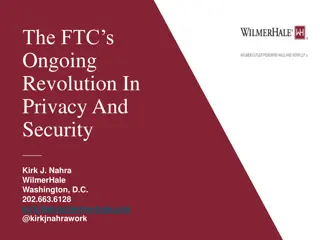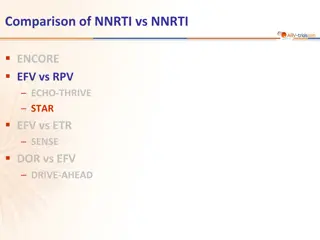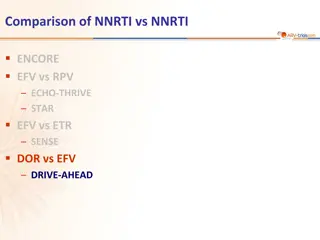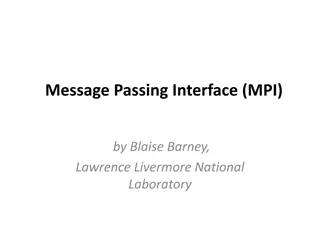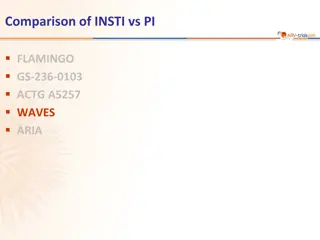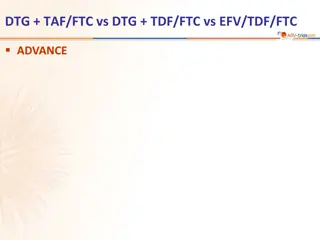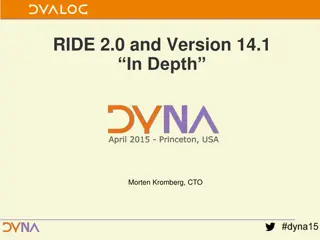
Data Portability: Concepts and Terminology Explained
Explore the core concepts and terminology surrounding data portability discussed by Professor Peter Swire at the FTC Data Portability Workshop. Gain insights into the reasons for the current focus on data portability, the right to data portability, and the proposed Portability and Other Required Transfers Impact Assessment. Dive into the significance of interoperability and the evolving landscape of data sharing. Discover key insights shaping the privacy, cybersecurity, and antitrust domains in the realm of data portability.
Download Presentation

Please find below an Image/Link to download the presentation.
The content on the website is provided AS IS for your information and personal use only. It may not be sold, licensed, or shared on other websites without obtaining consent from the author. If you encounter any issues during the download, it is possible that the publisher has removed the file from their server.
You are allowed to download the files provided on this website for personal or commercial use, subject to the condition that they are used lawfully. All files are the property of their respective owners.
The content on the website is provided AS IS for your information and personal use only. It may not be sold, licensed, or shared on other websites without obtaining consent from the author.
E N D
Presentation Transcript
An Overview of Portability: Concepts & Terminology Professor Peter Swire Scheller College of Business, Georgia Tech Alston & Bird LLP FTC Data Portability Workshop September 22, 2020
Overview Swire background, current 125-page study Three reasons for current intense focus on data portability Terminology: PORT Portability transfer data of one person, Right to DP Other Required Transfers transfer data of more than one person Dilemma: antitrust tends to open data flows, but privacy/security tend to close them Proposed answer: the Portability and Other Required Transfers Impact Assessment (PORT-IA) Show results from sectoral case studies, in U.S. and EU Multi-disciplinary assessment needed
Swire Background Now: Georgia Tech: Scheller College of Business Senior Counsel, Alston & Bird LLP Privacy since mid-90 s Clinton Administration Chief Counselor for Privacy, in OMB, 1999-2001 Lead author textbook for CIPP-US exam Professor of privacy, cybersecurity, and antitrust Privacy and antitrust FTC testimony 2007 Privacy as a non-price/quality aspect of competition Law review article on data portability 2013
Reasons for Current Interest Right to Data Portability (RtDP) - new laws GDPR, in effect 2018 California, in effect 2020 Intense policy debates now about digital platforms, both privacy and antitrust, both U.S. and EU Multiple sectors in U.S. and EU now have mandated data flows U.S. health care interoperability rule (new) EU Payment Services Directive (new)
Terminology: PORT RtDP is about an individual right to transfer data portability is a term of art for transfers of data of one person An individual right to transfer to self or 3d party Actual or proposed mandates to transfer databases, more than one person In Europe, called data sharing ; vague term, because data is shared in so many ways My paper proposes Other Required Transfers PORT: Portability or Other Required Transfers U.S. health care a hospital has a right to transfer all of its records to a new software provider EU Free Flow of Data Regulation - similar
Terminology (2) Interoperability Proposed definition - the technical ability of two or more systems to exchange information Common data formats Common communications protocols Other technical mechanisms to enable operation of two or more systems HHS Interoperability Rule (2020) uses the term in 3 ways: Term applies to the above And individual portability of health records And ORT, such as to new cloud provider
RtDP and Privacy: Existing General Laws Article 20 GDPR Right to Data Portability (RtDP) Data subjects have right to receive data they provided to controller Transfer without hindrance to another controller California Consumer Privacy Act, 1798.100 Individual right to access data in a portable and readily usable format Conclusion: since 2018 implementation of GDPR, RtDP widely mandated in E.U. and U.S.
The Dilemma: Open or Close Data Flows? Antitrust/competition many reasons to open data flows Assume some large, valuable databases Easy to assume that in our data economy Idea: if more companies have access to commercially valuable data, then more innovation and competition Privacy and Cybersecurity close data flows What if data gets to the wrong people? Cybersecurity focus on unauthorized access Privacy focus on what access should be authorized, and often be cautious unless there is user consent
Antitrust: Strong Interest in Portability FTC Director of Competition, Ian Conner, in February: The breadth of additional relief that may be considered include obligations to provide access or other rights [or] data to one or more entrants on specified terms or a non-discriminatory basis. Today s FTC workshop In Europe, Commissioner for Competition Margrethe Vestager discussed the prominent position of data in digital markets The need to ensure the possibility of entry may argue in favor of mandating access to data. Portability prominent in new European Data Strategy
Responding to the Dilemma Create a well-designed Portability and Other Required Transfers Impact Assessment ( PORT-IA ) Similar to Privacy Impact Assessment (US) or Data Protection Impact Assessment (E.U.) New study: methodology Draft structured questions for a systematic assessment Test the draft questions against multiple case studies Validate the structured questions based on the case studies
PORT-IA: Case Studies to Develop It US/EU Phone number portability Successful, but misleadingly easy case most users want their (private) phone number made known to friends and colleagues US/EU financial services Dodd-Frank requires portability for customer records US/EU health care March 2020 HHS Inter-operability Rule Individuals get portability to smartphone apps Health IT requirements that a covered entity can PORT to a new health IT provider Open Data for government databases Arizona & other laws auto dealers
PORT-IA: The Structured Questions Q1: Define the challenge or opportunity that leads to a possible data portability or other required transfers ( PORT ) Where does the data come from? Where does it go? What types of data are covered? What specifically are the legal requirements?
PORT-IA: (Top-Level Questions) Data PORTability Benefits: Q2: Assess PORT rationales based on competition Q3: Assess innovation and other commercial benefits due to the PORT Q4: Assess non-commercial benefits due to the PORT (user control) Q5: Assess regulatory or legal benefits of the initiative Q6: Assess any reduced benefits due to lack of technical or market feasibility Q7: Assess incentives for those presenting evidence of benefits
PORT-IA: Risks and Costs Data PORTability Risks and Costs: Q8: Assess privacy risks from the PORT Q9: Assess security risks from the PORT Q10: Assess risks from the PORT that may arise for either security or privacy (onward transfer; discriminatory standards) Q11: Assess risks to competition from the PORT Q12: Assess regulatory or legal risks of the initiative Q13: Assess any other significant costs or risks from the PORT, including obstacles to adoption Q14: Assess incentives for those presenting evidence of risks or cost
Distinction 1: Before or After Violation? Require portability before or after a violation occurs? Ex ante regulation No need to find an antitrust violation US Dodd-Frank, portability for financial records Ex post remedy Much antitrust discussion in U.S. to date If an antitrust violation, then court can order portability, which is less intrusive than breaking up the company
Distinction 2: General or Sectoral? General PORTability rule applies broadly GDPR RtDP CCPA RtDP Sectoral, in U.S. Phone number portability Financial services HHS interoperability rule Arizona and other auto dealer statutes
Reasons to consider using a PORT-IA Numerous PORT new laws and proposals Most individuals are not expert in privacy, cybersecurity, and antitrust Need a team to assess PORTability proposals PORT-IA provides a systematic technique to assess Antitrust regulators can realize privacy or security is not simply an excuse Privacy regulators can realize how competition benefits individuals, and be open to consent for PORTability Private sector can assess the most promising PORT initiatives
Conclusion Opening up data flows transferring data can have great benefits, for competition, innovation, freedom of choice, etc. Closing data flows for privacy and cybersecurity also can have great benefits PORT-IA provides a method that is agnostic about each proposal What are the benefits and costs from this required transfer? Can we increase the benefits? (such as focusing transfers where will help competition) Can we reduce the costs? (such as tailored privacy rules) For this complex and increasingly important topic, the PORT-IA can assist policy-makers and companies to reach better decisions









